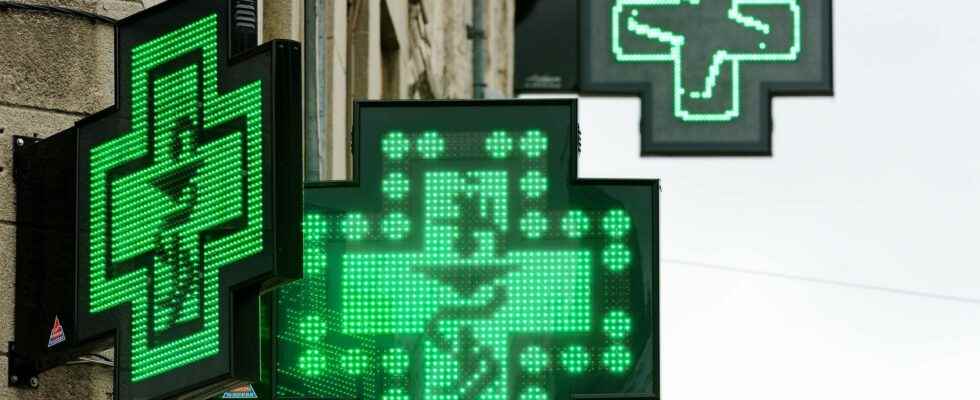Pharmacists are angry. The main pharmacists’ unions as well as the players in the pharmaceutical sector refused to sit on Thursday, January 26, on the generic monitoring committee organized by the Economic Committee for Health Products (CEPS). The announcement was made the day before at a press conference.
Generic drug manufacturers – which represent one in two drugs in France – and the main pharmacists’ unions oppose requests for price reductions on certain molecules requested by the State.
On December 16, 2022, pharmacists and laboratories learned that the government was considering a price reduction of seven molecules – concentrating 6.7% of the French generic market and 115 million boxes per year – including four drugs of major therapeutic interest , for a total amount of more than 67 million euros. The letter informing them of this intention had been sent by CEPSan interministerial body that sets the prices of drugs reimbursed by Social Security.
The fear of supply disruptions
“In France, medicines are already among the cheapest in Europe. They are sold more abroad than in France because the manufacturer, the wholesaler or the depositary earn more”, observes with L’Express Pierre -Olivier Variot. The president of the Union of Community Pharmacists (USPO) recalls that Germany and Portugal “have just raised the price of drugs in order to make them more attractive to manufacturers and thus avoid shortages”. He protests: “And we, in France, we will continue to lower prices… It is no longer possible, because if we continue like this, we will impoverish the French network in drugs and we will take the risk of ‘accelerate supply disruptions.’
The price reductions should notably concern metformin. This drug, a common antidiabetic (43 million boxes per year), is currently sold for 1.27 euros per box of 500 mg, and should increase to 1.11 euros per box. For example, again, the box of 28 capsules of esomeprazole (20 mg) should see its price drop by 12.5%. Or, in ten years, “the seventh price drop on esomeprazole, which is now sold for 3.36 euros per box”, regrets Jérôme Wirotius, vice-president of Gemme, the generics union, with from the Doctor’s Daily.
Bisoprolol, pantoprazole, and atorvastatin will also be affected by the CEPS planing blow. “These are first-line drugs, present in the therapeutic arsenal of all general practitioners in France. We cannot bear to have them out of stock”, worries Philippe Besset, president of the Federation of Pharmaceutical Unions of France. (FSPF) with from the Doctor’s Daily.
For several months, tensions have weighed on the supply of medicines. Two products, widely used by the French, concentrate the concerns: the pediatric versions of paracetamol and amoxicillin, the most prescribed antibiotic in the country, mainly to treat angina and infantile otitis. In this context of growing drug shortages, Elisabeth Borne announced on Thursday the installation of an interministerial mission responsible for formulating the first leads “within three months” and recommendations “by the summer of 2023” on “regulation ” and the “financing of health products”.
“The government must immediately freeze the fall in prices”
Generic producers have been fighting for several months against the “escape clause”. This tax mechanism concerns both expensive innovative drugs and those sold for a few euro cents. This “safeguard clause” was originally intended to make pharmaceutical companies pay in the event of a slippage in the drug budget. But, as it recalls The echoeswhat works for drugs under patent, which are expensive, does not work for generics: the more the use of generics increases in France, saving money for the State, the more the generic companies pay taxes.
When pharmacists sell generics, they receive a discount from generics representing on average 17% of the remuneration of pharmacies. Pharmacists therefore have no interest in this “safeguard clause”.
Worried, the representatives of the pharmaceutical chain are asking the public authorities for a moratorium on price reductions. “The government must immediately freeze the price cuts and then we enter into a real discussion on the question of public health, and more on a purely economic logic”, estimates Pierre-Olivier Variot. The president of the USPO asked “an emergency appointment” to the director of the National Health Insurance Fund (Cnam) Thomas Fatome “for the financial side” and to the Minister of Health François Braun “for the side organizational and substantive”.
Towards a pharmacists’ strike?
The discussions promise to be long. There are plenty of areas of concern. “It’s the law of maximum hassle today”, launches Pierre-Olivier Variot. Among the main grievances, in addition to supply disruptions – we spend 12 to 13 hours a week looking for drugs”, he notes – also includes the management of “third-party payment problems”. “We spend about ten hours dealing with these worries. We can’t get paid”, laments this pharmacist. He adds: “We would prefer to do something other than manage the administration. All this time that we spend, three quarters of our work time, is time that we cannot give to our patients.”
Pierre-Olivier Variot also regrets that we “disturb” the pharmacists on duty at night, “for anything and everything”. “These guards are carried out without security from the police, whereas it was the case before. We must redefine what emergency is, what we must do at night. There is no question of no longer do it, but it is a question of doing it well”, advances the president of the USPO.
If the demands of his union are not taken into account, the USPO does not rule out “going as far as a strike”, warns Pierre-Olivier Variot. In the meantime, a poster campaign was launched on Monday January 23 in the 21,000 pharmacies in France to inform patients about drug shortages. The theme of the poster: “Shortage of medicines: you want answers? We do too!”
